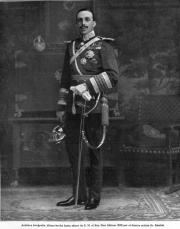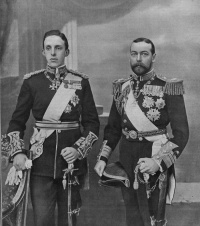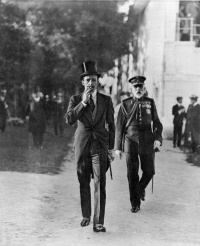A Young King: The Expectations for Spanish Regeneration↑
After the failure of the First Spanish Republic in 1873, a conservative seizure of power led to the restoration of the Bourbon monarchy with the ascendance of Alfonso XII, King of Spain (1857–1885) to the throne. The Restaurationist constitution of 1876 was expected to bring endemic antagonism between military and civilian powers to an end. The new system entailed a commitment between the monarch and two political parties (Conservatives and Liberals).
Alfonso XIII, King of Spain (1886-1941), who was born after his father's premature death, attained majority status at the age of sixteen. This prompted his mother, María Cristina, Queen, consort of Alfonso XII, King of Spain (1858-1929) to resign the regency in 1902. After the Spanish-American War of 1898, which had ended Spain's colonial empire, the young king represented the clearest example of a new generation that could change the face of the nation. Hence, Alfonso considered himself to be the long-awaited “regenerator” who would allow Spain to enter prosperous times and recover its prestige abroad.
Alfonso XIII grew up to be a soldier and was fond of wearing the captain general uniform in public. Although the Restoration regime wanted the army’s role and involvement in politics to decrease, the monarch took his position as commander-in-chief of the Spanish army seriously. In 1911, after a visit to Melilla, a Spanish city in Africa, the king was dubbed the epithet “The African.” Alfonso was always close to the army fighting in Morocco, making clear his support for this part of the army in crisis between civil and military powers.
The Restoration was a constitutional system of shared sovereignty between the monarchy and parliament. Due to King Alfonso's whims and the absence of parliamentary majorities in the pre-World War I period, the monarchy was actively involved in ministerial instability. Disagreements between the monarch and prime ministers resulted in the “Oriental Crisis” that referred to changes of governments originating from the Royal Palace (Palacio de Oriente).
The Great War↑
Despite Spanish neutrality in August 1914, the royal family was distressed by the European war because of each family member's background. The queen mother was born an Archduchess of Austria; Alfonso’s wife, Victoria Eugenia, Queen, consort of Alfonso XIII, King of Spain (1887–1969), was a granddaughter of Victoria, Queen of Great Britain (1837–1901).
Meanwhile, the king aspired to take the lead in organizing an international peace conference in Madrid. In August 1914 he had already proposed a Spanish-Italian joint arbitration, which he hoped would result in a Latin-sponsored peace agreement. In his public speeches, especially in the state opening of parliament, Alfonso XIII always emphasized Spanish neutrality and his commitment to peace, but in fact he was torn by conflicting opinions about the parties involved. Diplomatically, Alfonso exhibited contradictory behavior as military operations evolved and depending on the belligerent representative to whom he was speaking. He tended to speak ill of the British to the French and vice versa, doing the same with the Italians and Austrians. After Spanish unrest in the summer of 1917, including military insubordination (Juntas Nacionales de Defensa), political challenge to the system (Asamblea de Parlamentarios in Barcelona), and the revolutionary general strike, Alfonso XIII was considered to be more sympathetic to the German position.
A Pacifist King↑
Overall, Alfonso XIII tended to present himself as a pacifist and humanitarian king. After helping a French washerwoman find her husband, who was missing in action, in 1914, thousands of letters were sent asking for the Spanish king’s intervention in personal affairs. An office dealing with prisoners-of-war and missing personnel was established at the Royal Palace in Madrid. Forty members of the royal staff, as well as volunteers, worked together with Spanish diplomats all around Europe for prisoners’ relief. This office, in coordination with the Red Cross, consisted of several sections: missing-in-action soldiers; communications with occupied territories; war prisoners; repatriation of injured soldiers and civilians; internments in Switzerland; commutations; funding assistance for isolated people; and inspections carried out by Spanish delegates in Berlin, Vienna, and Rome. The office provided relief to more than 200,000 prisoners-of-war and evacuated nearly 70,000 civilians from unsafe zones. Official Alfonso XIII biographies argue that several blunders committed by the king during his reign were offset by his humanitarian work during the First World War; this was also a point made by the royalist propaganda in the Second Spanish Republic.
Postwar Actions↑
Although moves were made to nominate King Alfonso for the Nobel Peace Prize, they were never successful. Alfonso’s reputation was tarnished after the Disaster of Annual in July 1921, when the Berber leader Abd el-Krim (1882–1963) defeated the Spanish Army. Two years later, the king sided with General Miguel Primo de Rivera’s (1870–1930) dictatorship, dealing a death blow to the monarchy in Spain.
Carolina García Sanz, Escuela Española de Historia y Arqueología en Roma
Section Editor: Ana Pires
Selected Bibliography
- García Sanz, Fernando: España en la Gran Guerra. Espías, diplomáticos y traficantes, Barcelona 2014: Galaxia Gutenberg.
- Moreno Luzón, Javier: Modernizing the nation. Spain during the reign of Alfonso XIII, 1902-1931, Portland 2012: Sussex Academic Press.
- Pando Despierto, Juan: Un rey para la esperanza. La España humanitaria de Alfonso XIII en la Gran Guerra, Madrid 2002: Temas de Hoy.
- Tusell, Javier / Queipo de Llano, Genoveva García: Alfonso XIII. El rey polémico, Madrid 2001: Taurus.










